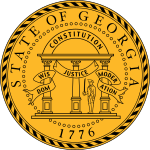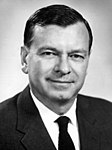1948 Georgia gubernatorial special election
| ||||||||||||||||||||
410 county unit votes 206 unit votes needed to win | ||||||||||||||||||||
|---|---|---|---|---|---|---|---|---|---|---|---|---|---|---|---|---|---|---|---|---|
| ||||||||||||||||||||
 County results Talmadge: 40-50% 50-60% 60-70% 70-80% 80-90% Thompson: 40-50% 50-60% 60-70% 70-80% | ||||||||||||||||||||
| ||||||||||||||||||||
| Elections in Georgia |
|---|
 |
The 1948 Georgia gubernatorial special election took place on November 2, 1948, in order to elect the Governor of Georgia.
The Supreme Court of Georgia resolved the three governors controversy in the wake of the 1946 election by affirming lieutenant governor-elect Melvin E. Thompson's succession to the office of governor.[1] The state constitution in effect at the time then required a special election to be held simultaneously with the next state legislative election to fill the remainder of the term.[2]
Herman Talmadge, the son of the winner of the 1946 election, the late Eugene Talmadge,[3] defeated Governor Thompson in the Democratic primary by a margin of 51.8% to 45.1% with three other candidates getting 3.1% of the vote[4][5] and then proceeded to win the general election with 97.51% of the vote.
As was common at the time, the Democratic candidate ran with only token opposition in the general election so therefore the Democratic primary was the real contest, and winning the primary was considered tantamount to election.
Democratic primary
[edit]The Democratic primary election was held on September 8, 1948. As Talmadge won a majority of county unit votes, there was no run-off.
County unit system
[edit]From 1917 until 1962, the Democratic Party in the U.S. state of Georgia used a voting system called the county unit system to determine victors in statewide primary elections.[6]
The system was ostensibly designed to function similarly to the Electoral College, but in practice the large ratio of unit votes for small, rural counties to unit votes for more populous urban areas provided outsized political influence to the smaller counties.[7][8]
Under the county unit system, the 159 counties in Georgia were divided by population into three categories. The largest eight counties were classified as "Urban", the next-largest 30 counties were classified as "Town", and the remaining 121 counties were classified as "Rural". Urban counties were given 6 unit votes, Town counties were given 4 unit votes, and Rural counties were given 2 unit votes, for a total of 410 available unit votes. Each county's unit votes were awarded on a winner-take-all basis.[7][8]
Candidates were required to obtain a majority of unit votes (not necessarily a majority of the popular vote), or 206 total unit votes, to win the election. If no candidate received a majority in the initial primary, a runoff election was held between the top two candidates to determine a winner.[9]
Candidates
[edit]- Hoke O'Kelley, businessman[10]
- Joseph A. Rabun, pastor[11]
- Herman Talmadge, former Governor, removed from office during the three governors controversy
- Melvin E. Thompson, incumbent Governor
- Hoke Willis, railroad clerk[12]
Results
[edit]| Candidate | Popular vote | County unit vote | ||
|---|---|---|---|---|
| Votes | % | Votes | % | |
| Herman Talmadge | 357,865 | 51.77 | 312 | 76.10 |
| Melvin E. Thompson | 312,035 | 45.14 | 98 | 23.90 |
| Hoke O'Kelley | 13,226 | 1.91 | ||
| Hoke Willis | 4,963 | 0.72 | ||
| Joseph A. Rabun | 3,150 | 0.46 | ||
| Total | 691,239 | 100.00 | 410 | 100.00 |
| Source: [13][5][14] | ||||
General election
[edit]In the general election, Talmadge faced token opposition.
Results
[edit]Barfoot was a candidate of the Progressive Party.[15]
| Party | Candidate | Votes | % | ±% | |
|---|---|---|---|---|---|
| Democratic | Herman Talmadge | 354,711 | 97.51% | ||
| Write-in | Morgan Blake | 8,017 | 2.20% | ||
| Write-in | James L. Barfoot | 665 | 0.18% | ||
| Write-in | Melvin E. Thompson | 324 | 0.09% | ||
| Write-in | Ralph McGill | 22 | 0.01% | ||
| Write-in | All others | 24 | 0.01% | ||
| Turnout | 363,763 | 100.00% | |||
| Democratic hold | Swing | ||||
References
[edit]- ^ Thompson v. Talmadge, 41 S.E.2d 883 (Ga. 1947).
- ^ "1945 Constitution of Georgia" (PDF). p. 32.
- ^ "Herman Talmadge (1913-2002)". New Georgia Encyclopedia. Archived from the original on December 17, 2005. Retrieved January 13, 2013.
- ^ "Melvin E. Thompson (1903-1980)". New Georgia Encyclopedia. Archived from the original on September 16, 2012. Retrieved January 13, 2013.
- ^ a b "GA Governor, 1948 - Special D Primary". Our Campaigns. Retrieved November 14, 2020.
- ^ "County Unit System". Georgia County Clerks Association. Archived from the original on May 31, 2008. Retrieved November 14, 2020.
- ^ a b "Eugene Talmadge". The Jim Crow Encyclopedia. The African American Experience. Archived from the original on January 23, 2015. Retrieved August 12, 2013.
- ^ a b "County Unit System, eh?". Richard B. Russell Library for Political Research and Studies. October 6, 2011. Retrieved November 14, 2020.
- ^ Buchanan, Scott (June 13, 2017). "County Unit System". New Georgia Encyclopedia. Retrieved November 14, 2020.
- ^ "Hoke O'Kelley Memorial Library". Emory University: History and Traditions. Retrieved November 14, 2020.
- ^ Rev. William C. Kernan (January 24, 1947). "The Common Defense". The Ithacan. Vol. XVIII, no. 14. Ithaca College, Ithaca, NY. p. 2. Retrieved November 14, 2020.
- ^ "Qualifications Of Candidates Listed" (PDF). The Technique. Atlanta, Georgia. August 27, 1948. p. 2. Retrieved November 14, 2020.
- ^ Congressional Quarterly 1998, p. 107.
- ^ Georgia Register 1950, pp. 574–577.
- ^ "Fire damages Barfoot home, 2 buildings". The Atlanta Constitution. Atlanta, Georgia. September 25, 1948. p. 1. Retrieved November 14, 2020.
- ^ Congressional Quarterly 1998, p. 48.
- ^ "GA Governor, 1948 - Special Election". Our Campaigns. Retrieved November 14, 2020.
- ^ Glashan 1979, pp. 68–69.
- ^ Georgia Register 1950, pp. 614–617.
- ^ America Votes 5, p. 82.
Bibliography
[edit]- Gubernatorial Elections, 1787-1997. Washington, D.C.: Congressional Quarterly Inc. 1998. ISBN 1-56802-396-0.
- Glashan, Roy R. (1979). American Governors and Gubernatorial Elections, 1775-1978. Meckler Books. ISBN 0-930466-17-9.
- Compiled by Mrs. J.E. Hays, State Historian and Director (1950). Georgia's Official Register, 1945-1950 (PDF). Atlanta, GA: State of Georgia, Department of Archives and History.
- Scammon, Richard M., ed. (1964). America Votes 5: a handbook of contemporary American election statistics, 1962. Pittsburgh, PA: Governmental Affairs Institute.
- Georgia (U.S. state) gubernatorial elections
- 1948 United States gubernatorial elections
- 1948 Georgia (U.S. state) elections
- United States gubernatorial special elections
- Georgia (U.S. state) special elections
- Single-candidate elections
- November 1948 events in the United States
- September 1948 events in the United States


